Byting wisely: The varying narratives of nationalism and independence

Being a high school teacher who was born between the Millennial-Gen Z cusp, I tend to use my knowledge of the evolving internet culture in forming connections in the classroom. For example, a student would shoot a remark and I would humour them with a sarcastic "Wow, graape!"—referencing an obscure internet meme of a Pakistani school principal responding to a student screaming into a microphone that he would like to join the military when he grows up so he can destroy India. I bring this up because before I did my research for this essay, I'd only taken this so-called "meme" at face value, inferring the principal's apathy to be resultant of either boredom or, as the internet puts it, from being "done with life." However, in said research, I'd stumbled upon an article from the Indian news and media website, The Quint, which illustrated how Bangladesh's liberation war and the resulting Indo-Pak conflicts are depicted in respective countries' national school textbooks. Naturally, the Indian textbook used language that vilified the Pakistani regiment and alluded to their own righteousness in extending help to a vulnerable populace, while the Pakistani textbook blamed India for conspiracies and instigation. But most strikingly, this paragraph ended with the directive for "all [learners to] receive military training and be prepared to fight the enemy"—and this is from the fifth grade syllabus of Social Studies!
I cannot speak for the legitimacy of these examples because a common issue that plagued the sources I found in my research was the lack of effective, verifiable citations. However, each article, each Quora answer, and each Goodreads review (foreshadowing: even a peer-reviewed book!) was soaked in bias—sometimes jingoistic in nature and very explicit, other times, more implicit and rooted in national myths. It was fascinating to compare the accounts of the Liberation War that I had learned at school and at home with that of foreign perspectives—of the ally as well as the (former) enemy. And the revelations from it, dear reader, feel more relevant than ever to me now.
Allow me to back-track and catch you up on how this began: family time at my home involves the three women of the house (Nanu, Ammu, and myself) bingeing Pakistani dramas from Youtube on weekends and lazy holidays. One such afternoon, a thought occurs to Ammu: how do the Pakistanis view and depict the 1971 War? Instantly, I'm inspired to find whatever Pakistani media is out there on the subject. A quick Google search leads me to Jo Bichar Gaye (2022), Khaab Toot Jatay Hain (2022), Khel Khel Mein (2021), and Hangor S131 (2021). Since discovering these titles last year, I was excited for us to watch these together during our "family time" sessions, particularly in anticipation of Nanu's reaction to them, owing to the interesting dynamic of pitting my Nanu's unwavering fondness for Pakistani dramas against her experience as a freedom fighter herself and being the widow of one.
My Nanabhai, Late Shahadat Hossain Badol, was in the Mukti Bahini and had received military training from the Indian Army in Dehradun, and at his home in the Borundi village of Manikganj had operated a guerilla base where my Nanu was in charge of supervising the arms. I have grown up hearing Nanu recall harrowing tales of her mother-in-law picking her up in her pregnant state to run and hide from Pakistani soldiers passing by—of having to remain submerged in ponds for what would feel like hours, concealed shoddily by an outgrowth of water plants or stray banana tree leaves, holding their breaths and lives at the edge of their fear-stricken mouths.
Watching officers of the Pakistani Army being depicted as victims of the wrath of the seemingly uncouth Bangalis in Jo Bichar Gaye—I felt disgusted at how it created a mockery out of my Nanu's lived traumas. As the three of us watched the drama, we would frequently pause the video to discuss what was just shown: I would express rage, Ammu would be confused, and Nanu, strikingly silent. Ammu would try to rationalise that the show wasn't blaming the Bangalis, but rather, the Indians who had instigated them. I would exclaim in frustration how that is such blatant denial of the atrocities West Pakistan had committed upon us Bangalis. But Nanu—the person whose lived experiences were facing erasure at the hands of this show's creators, the person I had anticipated to be the most vocal in expressing her disdain towards such shameless revisionism—barely said anything. However, I could sense how hurt she was by this portrayal. With a little prodding, Nanu opened up and shared another story with me—of how Nanabhai had captured two soldiers of the Pakistani Army and kept them imprisoned at their home for two weeks. She detailed how she would cook for them and serve them glasses of milk with thick films of cream floating on top. These were the same food that she would serve to the Mukti Bahini soldiers staying at the house. And by the end of their imprisonment, the Pak-soldiers would admit how they were told that their mission was to kill kafirs in East Pakistan, but now that they had seen the Bangalis from such close vantage, it was clear to them that they were sent to murder their own fraternity.
Nanu did not need to say anything more. I guess she did not need to see anything more either because once we finished watching Jo Bichar Gaye and attempted to watch the other shows from the list, we realised how each of them were parroting off the same ideas and we could not palate any more of it. It was all the same narrative: some professors at Dhaka University were RAW agents under India's payroll, tasked with the responsibility of brainwashing naive university-going students who apparently had no thoughts of their own, and knew only violence in asking for their rights as they chased and killed innocent West Pakistani students at the university. They did not bother contextualising why Bangalis were asking for their rights in the first place—obviously. The focus was on framing the West Pakistani regiment as acting in self-defence—even Operation Searchlight. The horrors of the kalo raat were reduced to being an operation for incapacitating the conspirators at Dhaka University to foil their plan of massacring the families of the Pak-army outposted in the East—shamelessly in contrast with its documented accounts I had seen at the Liberation War Museum in Agargaon and read in the diary entries of Jahanara Imam in Ekattorer Dinguli (Shondhani Prokashoni, 1986).
The Jo Bichar Gaye episode on the revisionist portrayal of Operation Searchlight ended with a sombre voiceover claiming how that same night, after the execution of their mission, Bangalis at various parts of the land had massacred innocent Biharis. These claims were aided with visuals from PTV interviews showing women and men who were apparent sufferers of the Bangali wrath. At this point, I felt confused. Was there any semblance of truth to this?
I first asked Nanu to verify those reports. Nanu recalled how the Pak-army indiscriminately killed civilians that night—how one of her friends' husbands was shot dead at Sadarghat while trying to flee the Pak-army's brutality. I still dug further. I tried to find the book Jo Bichar Gaye is based on—a failed attempt that serendipitously led me to Sarmila Bose's Dead Reckoning (Hurst Publishers, 2011). As I skimmed through several of its chapters on the Internet Archive website, I could infer a similar issue in Bose's investigative nonfiction—her intent of challenging the national myths of India surrounding the 1971 War lacked the same contextualisation that the Pakistani media also conveniently left out from their narratives.
Reviews of Bose's book on The Guardian, The Daily Star, and Goodreads critiqued it for its flawed and biassed research methodology. Her diction in referring to retired Pak-soldiers as "gentlemen" who were "recalling" the incidents while using phrasings like "claimed" in referring to her Bangali interviewees illustrated her bias quite adeptly. And I found it to be further cemented by her article in the Al Jazeera website—a shallow apologist piece that tried to legitimise her book by quoting unnamed peer reviews calling it "courageous" and explaining how any "myth-busting" text would be faced with backlash for challenging one's existing beliefs. As much as I detested Bose's attempts at both counts, she did point out a very important issue to me: the question of Biharis.
Admittedly, I could not locate any reports that could verify whether Biharis in the East were subjected to oppression of any kind during or even before the war. Rather, my research made it glaringly obvious that a lot of the Biharis were razakars—an interesting word to me because in Urdu, it literally means volunteer and thus reserves highly positive connotations, while in Bangla, it's no less than a gali. It also became quite glaringly obvious that with the frequency and intensity with which the Bangalis were persecuted at the time, it was not really possible for this oppressed group to try and oppress a group that is advantaged by their loyalty in language and sentiment to the West Pakistani cause. However, this also led me to a heartbreaking and shameful revelation—one that is possibly blasphemous to many in my country: that the Biharis faced severe persecutions at the hands of several former Mukti Bahini soldiers following the victory on December 16.
Perhaps the posthumously published memoir of Dr Syed Sajjad Hussain, former Vice Chancellor of Dhaka University, would serve as the most reliable witness to this atrocity. In The Wastes of Time (Institute of Islamic Culture, Lahore, 1996), the very first chapter details how on December 20, 1971, he was abducted from his home and stabbed seven times before being abandoned to fend for himself on account of the accusation of being a razakar. I have read personal accounts from Biharis who recounted how men of the Mukti Bahini had raided their homes and killed their men in the aftermath of the liberation—these accounts were much akin to Nanu's accounts of Pak-army's raids in her village. So I find myself questioning how justified it was for the Mukti Bahini to hunt and kill apparent razakars. That too without a fair trial?
There's more to it though. Biharis, now a persecuted minority in Shadhin Bangla—a "stranded community"—was denied entry in Pakistan. Does that sound familiar? In case it doesn't, allow me to recall the several times since October 7 that Israel has refused Hamas' deals of returning hostages in exchange for a ceasefire. The parallels here strikingly elucidate just how disposable these people are for genocidal governments. So I circle back to Jo Bichar Gaye and Khaab Toot Jatay Hain and their touting woes for the Biharis. I think of zionist supporters of Israel "but Hamas"-ing their way out of any emotional accountability in the comments of Tiktok videos and Instagram reels spreading awareness of the atrocities. With the evidence surfacing of the Israeli volunteer group, ZAKA's fabrication of the "beheaded babies" story framing Hamas from October 7, and the current buzz around zionist business magnates trying to buy out Tiktok, it is becoming increasingly, intensively concerning for the mass to find believable news and information sources, both in the mainstream as well as online.
However, it is not only the Israel-Hamas issue that raises such concerns in me—albeit interconnected, it's the selective suppression of content on social media with the phenomenon of 'shadowban' affecting creators who try to speak out against the status quo (now even reinforced more explicitly with Meta's new policy of limiting political content); it's the algorithm driven state of social media creating pristinely personalised bubbles for each user so that you never have to face the world outside it; it's the paranoia regarding AI advancements and how they can be weaponised by literally anyone to manipulate information; it's the ongoing genocides and exploitative practices many of us remain uninformed on; it's the problem of netizens polluting the online landscape with sweeping statements that criminalise entire nationalities and entire religious groups. It is clear to me, hence, that we live in times when it's not only the freedom of speech that's under attack, but also the freedom of choosing what you consume. And this is not only limited to information, media and entertainment, but also commodities and daily necessities.
I recall a salesperson at a superstore telling me how one cannot practically participate in boycott movements in Bangladesh because local products are too poor in quality to make for viable substitutions. And truly, whether someone's stance on boycotting products comes from a lack of privilege or stems from dependence on certain luxuries, it remains crucial that we all, at the very least, become conscious consumers. Let's consider the mining of cobalt for smartphones as an example: whether you consider it a luxury or necessity, is it possible for you to really escape this system that makes a smartphone crucial to your survival? Even when you abhor the exploitative practices of child labour behind the industry? In spite of it, what you can do is know what you're consuming and give it a second-thought before rushing to discard the one-year-old device for the latest release. What you can do is know what you're reading or watching on social and mainstream media and question its credibility: dig into its nuances, consider opposing perspectives. I will tell you, during my research for this essay, I did also come across several articles and websites that explored the origins of zionism. I got to learn what motivated them to begin with—throughout, fearing that learning about their belief may make me empathise with their cause. However, I can now attest with conviction that knowing their history actually strengthened my insights on why the zionist agenda is horrifyingly misguided. Thus, as evident from the Pakistani imagination of Ekattor in their media, from the zionist propaganda of "but Hamas-", and the ongoing genocide of the truth across multiple platforms: history is malleable–even as it is being made.
So in the spirit of Independence, I urge my reader to exercise independence of consumption—to question what you are buying, what you are reading, what you are watching, and which of these you are really given the freedom to choose. Strengthening one's critical-thinking skills is more crucial now than ever–question and defy the rules of the domains you frequent, whether it be of capitalistic commodities or online platforms; question your own role in the subjugation and oppression of other peoples (think: the indigenous minority and people of religious minority in your own country); and then do better. We owe this to the ancestors we have lost to the systemic injustices of their times; we owe it to their struggle for freedom, to continue to consciously, conscientiously exercise ours.
Tashfia Ahmed is an educator, poet and contributor for Star Books and Literature. She teaches English at Scholastica school.

 For all latest news, follow The Daily Star's Google News channel.
For all latest news, follow The Daily Star's Google News channel. 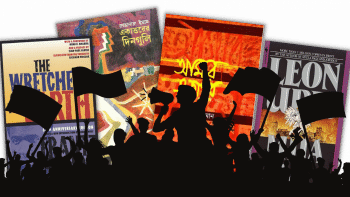

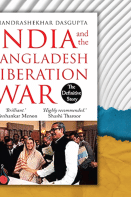


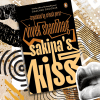
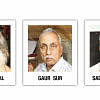

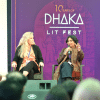
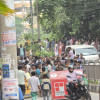


Comments